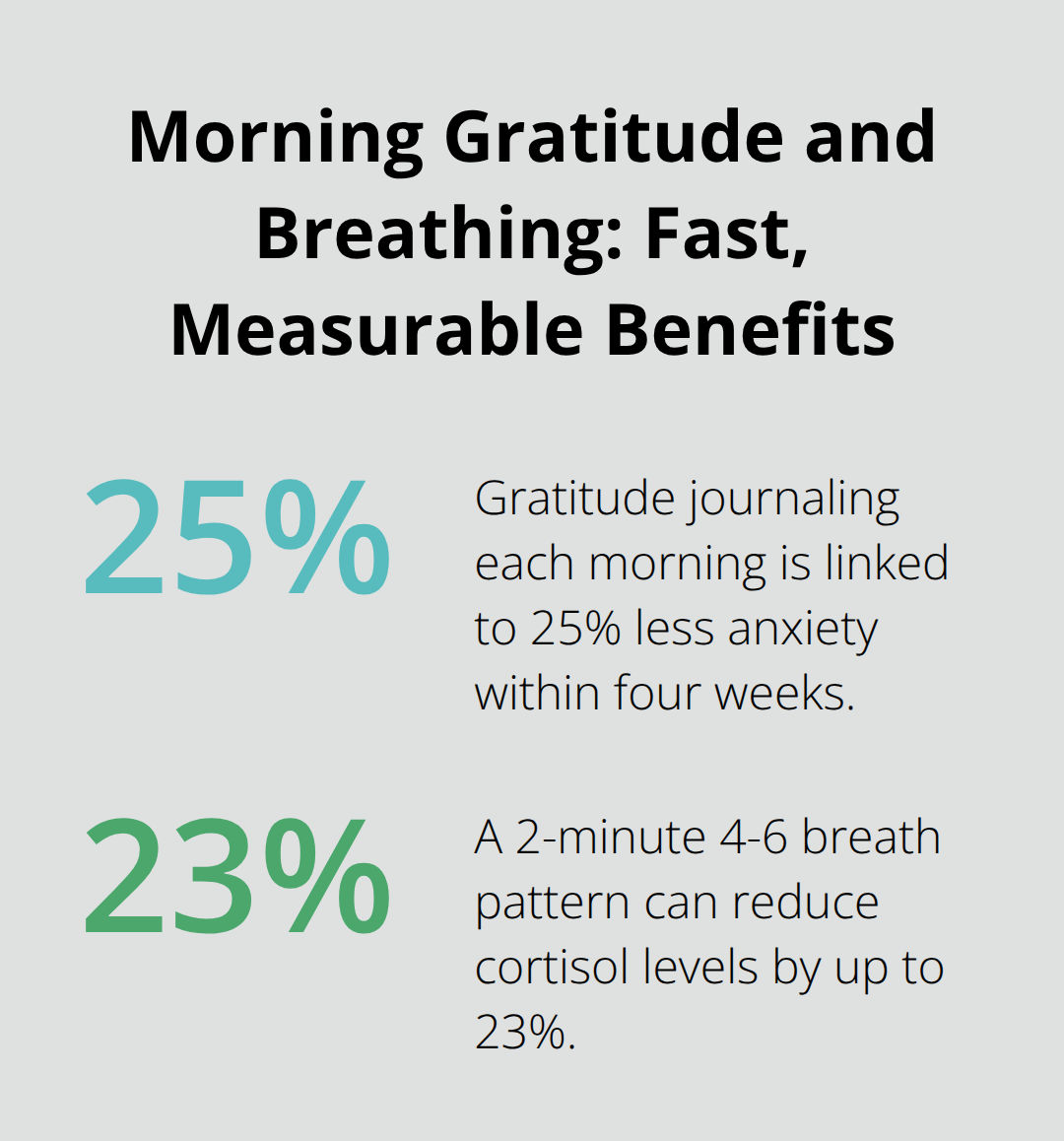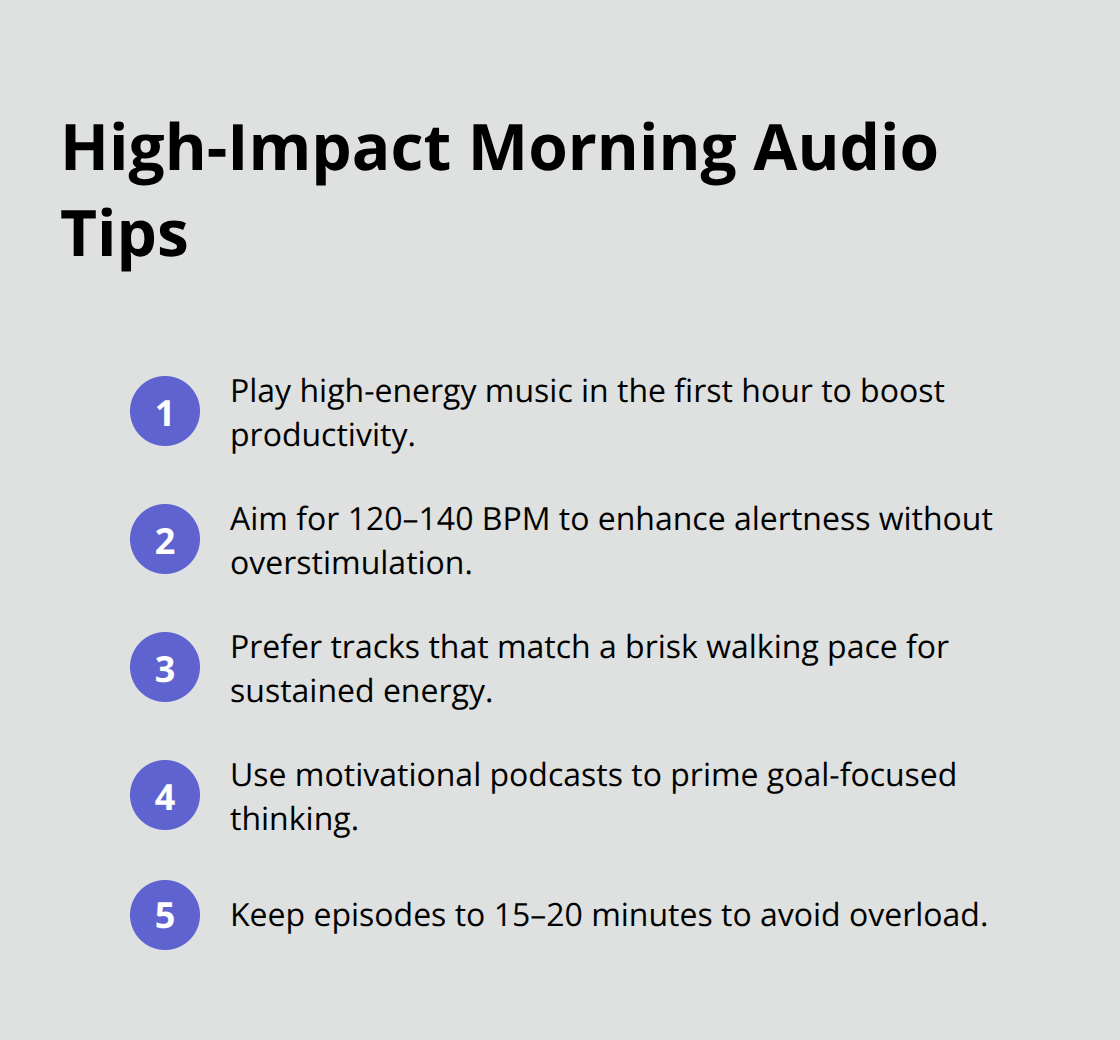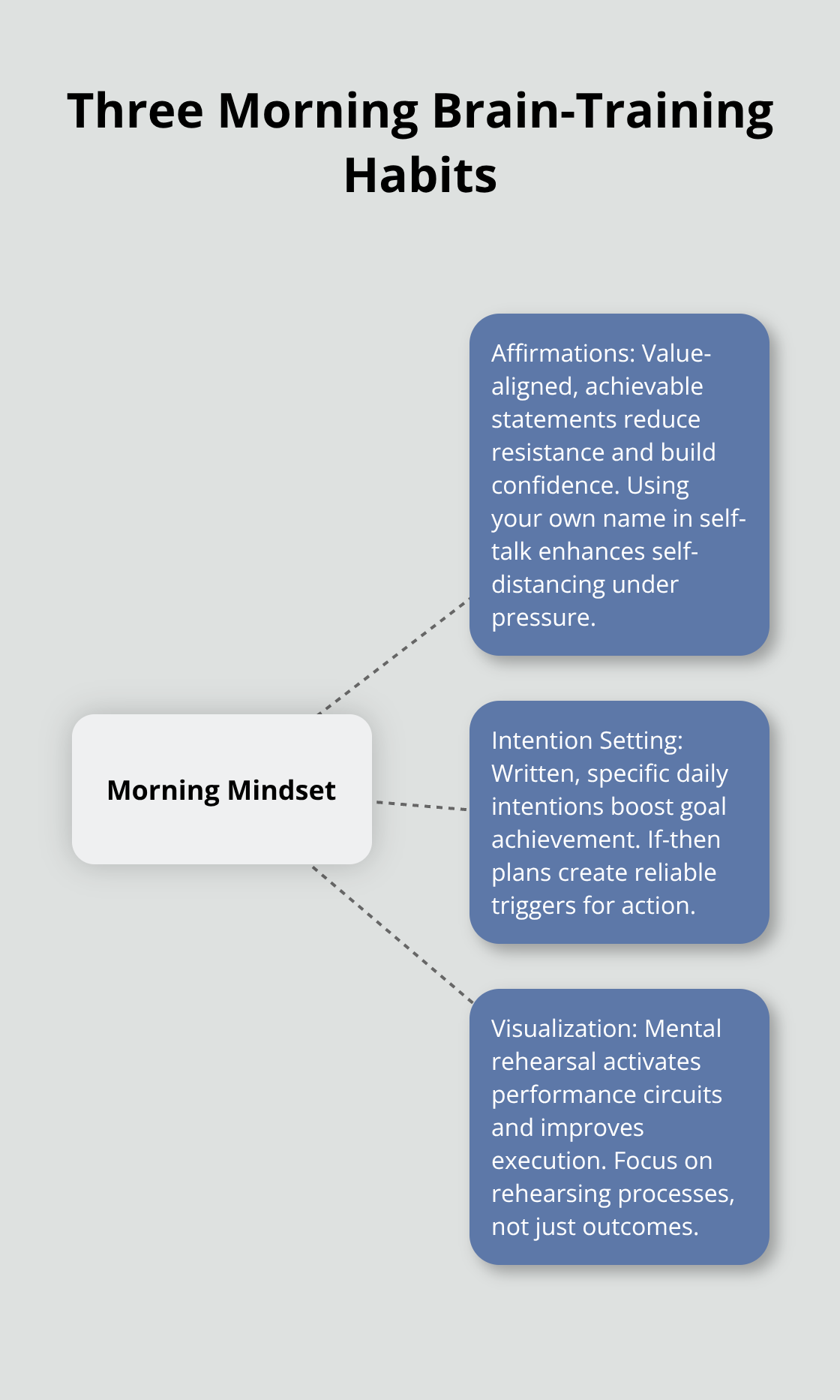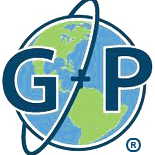Your morning sets the foundation for everything that follows. The first hour after waking shapes your mood, energy levels, and overall outlook for the entire day.
We at Global Positive News Network believe that good morning positivity isn’t just wishful thinking-it’s a science-backed approach to better living. Research shows that people who start their day with intentional positive practices report 23% higher life satisfaction and improved mental health outcomes.
What Morning Routine Actually Works?
Sleep researchers at Stanford University found that people who wake up at the same time every day, including weekends, experience 31% better sleep quality and report significantly higher energy levels throughout the day. Your circadian rhythm thrives on consistency, not flexibility. The American Sleep Association confirms that adults who maintain regular sleep schedules fall asleep 14 minutes faster and wake up feeling more refreshed. Set your alarm for the same time every single day, even when you don’t have work commitments.
The 5-Minute Gratitude Practice That Changes Everything
Harvard Medical School research shows that people who write down three specific things they’re grateful for each morning experience 25% less anxiety and improved immune function within just four weeks. Skip generic gratitude like thankfulness for family. Instead, focus on precise details: the way sunlight hit your coffee cup, how your neighbor smiled yesterday, or the texture of your favorite blanket.

Pair this with a two-minute breath exercise where you inhale for four counts and exhale for six counts. This activates your parasympathetic nervous system and reduces cortisol levels by up to 23% (according to UCLA’s Mindfulness Research Center).
Movement That Actually Energizes You
Physical therapists at Johns Hopkins recommend 10 minutes of morning stretch to increase blood flow and reduce morning stiffness by 40%. Start with gentle neck rolls, shoulder shrugs, and spinal twists before your feet hit the floor. The Mayo Clinic found that people who do light movement within 30 minutes of wake-up report 28% higher productivity scores. Even five jumps or a brief walk around your home triggers endorphin release and prepares your muscles for the day ahead.
Cold Water Exposure for Instant Alertness
Research shows that cold water exposure has significant effects on mental health and physiological responses. End your morning shower with 30 seconds of cold water (gradually work up to this temperature). Stanford neuroscientist Andrew Huberman confirms that cold exposure activates your sympathetic nervous system and increases dopamine levels for up to four hours afterward.
The content you consume in those first precious morning moments shapes your entire mental framework for the day ahead.
What Content Should Fill Your Morning Mind
Your brain processes information more effectively in the first hour after waking, according to neuroscience research from MIT. This window represents your most valuable mental real estate, yet most people waste it as they scroll through doom-filled headlines and negative social media feeds. Studies from the University of Pennsylvania show that people who consume negative news within 30 minutes of waking experience higher stress hormones throughout the day and report significantly lower mood scores.
Replace Traditional News with Solution-Focused Sources
Traditional news outlets follow the “if it bleeds, it leads” formula because negative content generates more engagement than positive stories, according to media research from Columbia Journalism School. This creates a distorted worldview where problems seem insurmountable and progress remains invisible.
Solution-focused journalism highlights innovations, breakthroughs, and human progress instead of amplifying fear and division. The Reuters Institute found that people who consume solution-focused news report higher optimism levels and increased civic engagement. Swap your morning news app for sources that showcase scientific breakthroughs, community victories, and positive social change. Your brain will respond with improved focus and reduced anxiety.
Strategic Audio Content for Mental Preparation
Spotify data reveals that people who listen to high-energy music within the first hour of waking maintain higher productivity levels throughout the day. Choose songs with 120-140 beats per minute to match your optimal heart rate for alertness without overstimulation (this range mirrors your natural walking pace and feels energizing rather than overwhelming).

Motivational podcasts work differently than music – they activate your prefrontal cortex and prime your brain for goal-oriented thinking. Research from Northwestern University shows that people who listen to success stories and practical advice in the morning make better decisions during their workday. Limit podcast episodes to 15-20 minutes to avoid information overload.
Social Media Boundaries That Protect Your Energy
Social media algorithms prioritize controversial content because outrage drives engagement. Facebook’s own internal research shows that angry reactions generate five times more visibility than positive ones. This means your morning scroll exposes you to the most divisive content available, which triggers stress responses and negative thought patterns.
Create specific boundaries around morning social media use. Check platforms only after you complete your positive morning routine, or better yet, wait until afternoon. Studies from the University of California show that people who delay social media consumption until after 10 AM report better mood stability and increased focus on personal goals throughout the day.
The content you choose shapes more than just your mood – it programs your brain’s filter system for how you interpret every subsequent experience. This mental framework becomes the foundation for the positive mindset habits that transform your entire approach to daily challenges.
How Do You Rewire Your Brain for Daily Success
Your brain operates like a prediction machine. It constantly filters reality through the mental patterns you feed it each morning. Neuroscientist Dr. Rick Hanson from UC Berkeley explains that your brain processes 11 million bits of information per second but only brings 40 bits into conscious awareness. This filter system determines whether you notice opportunities or obstacles, solutions or problems.
The University of Toronto found that people who practice specific morning mindset techniques experience 34% better problem-solving abilities and report higher confidence levels throughout their day. Your internal dialogue shapes this entire filter process, which makes morning mental programming the most powerful tool for daily transformation.
Affirmations That Actually Change Brain Structure
Generic affirmations like “I am successful” fail because they contradict your current reality and trigger psychological resistance. Carnegie Mellon research shows that self-affirmation works only when statements align with your core values and feel achievable.
Use present-tense statements tied to specific actions: “I handle challenges with calm focus” or “I notice opportunities in difficult situations.” Neuroscientist Dr. Ethan Kross found that people who use their own name in positive self-talk (rather than saying “I”) enhance self-distancing and perform better under pressure.
Spend three minutes each morning repeating value-based affirmations while you look in the mirror. This activates multiple brain regions simultaneously and strengthens neural pathways associated with self-confidence.
Intention Setting That Drives Results
Harvard Business School research reveals that people who write down specific daily intentions achieve their goals 42% more often than those who keep intentions mental. Skip vague intentions like “be productive” and focus on precise behavioral targets: complete three priority tasks before you check email or have one meaningful conversation with a colleague.
Neuroscientist Dr. Heidi Grant found that implementation intentions (if-then planning) increase success rates by 300%. Structure your intentions as conditional statements: “If I feel overwhelmed, then I will take five deep breaths and refocus on my current task.”
Visualization That Programs Success
Olympic athletes use visualization because it activates the same brain regions as actual performance. Stanford sports psychology research shows that mental rehearsal improves performance by 23% compared to physical practice alone.

Spend five minutes visualizing your ideal day with specific sensory details. See yourself confidently handling meetings, feel the satisfaction of completing tasks, hear positive feedback from others. The key lies in visualizing the process, not just outcomes. Mental rehearsal of specific actions and responses prepares your brain to recognize and execute those behaviors automatically when real situations arise.
Final Thoughts
These morning practices create a compound effect that transforms your entire life trajectory. The Stanford sleep research, Harvard gratitude studies, and Carnegie Mellon affirmation findings all point to the same truth: consistent morning routines generate measurable improvements in mental health, productivity, and life satisfaction. People who implement these evidence-based strategies report sustained energy levels, better decision-making abilities, and increased resilience during challenging situations.
The neuroplasticity research shows that your brain literally rewires itself when you practice good morning positivity techniques consistently for just four weeks. Start with one practice rather than attempting everything simultaneously. Choose the technique that resonates most strongly with your current lifestyle (whether that’s the five-minute gratitude exercise, strategic content consumption, or visualization training). Build that single habit into an automatic routine before you add additional elements.
We at Global Positive News Network understand that sustainable change happens through small, consistent actions rather than dramatic overhauls. Our platform provides the uplifting content and inspiring stories that support your morning positivity practice with solution-focused journalism and community impact stories. Your morning routine becomes the foundation for everything that follows, and these practices create lasting patterns that enhance your overall quality of life.


